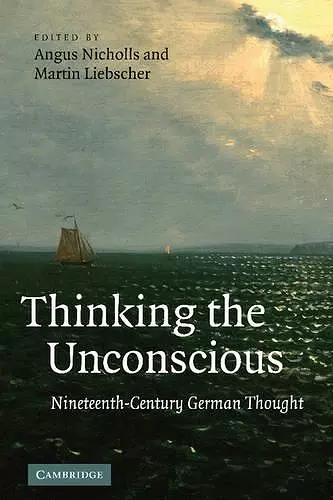Thinking the Unconscious
Nineteenth-Century German Thought
Angus Nicholls editor Martin Liebscher editor
Format:Hardback
Publisher:Cambridge University Press
Published:24th Jun '10
Currently unavailable, and unfortunately no date known when it will be back
This hardback is available in another edition too:
- Paperback£38.99(9781107411760)

This volume examines nineteenth-century German theories and representations of the unconscious, and the extent to which they may have influenced Freud.
Since Freud, the concept of the unconscious has exerted an enormous influence upon psychoanalysis, psychology, literary, critical and social theory. This volume examines the many theories of the unconscious that existed in nineteenth-century German thought, and the extent to which they may have influenced Freud and the origins of psychoanalysis.Since Freud's earliest psychoanalytic theorization around the beginning of the twentieth century, the concept of the unconscious has exerted an enormous influence upon psychoanalysis and psychology, and literary, critical and social theory. Yet, prior to Freud, the concept of the unconscious already possessed a complex genealogy in nineteenth-century German philosophy and literature, beginning with the aftermath of Kant's critical philosophy and the origins of German idealism, and extending into the discourses of romanticism and beyond. Despite the many key thinkers who contributed to the Germanic discourses on the unconscious, the English-speaking world remains comparatively unaware of this heritage and its influence upon the origins of psychoanalysis. Bringing together a collection of experts in the fields of German Studies, Continental Philosophy, the History and Philosophy of Science, and the History of Psychoanalysis, this volume examines the various theorizations, representations, and transformations undergone by the concept of the unconscious in nineteenth-century German thought.
Review of the hardback: 'From 'Discovering' to 'Thinking the Unconscious': this book offers an enlightening contribution to this still demanding and paradoxical task.' Ludger Lütkehaus, University of Freiburg
Review of the hardback: 'While the conceit that Freud discovered – or invented – the unconscious, has long been dispatched, this collection explores in fascinating detail the tangled roots of the concept in the works of Leibniz and Kant and traces its surprising ramifications through the thought of the German Romantics and their successors. The authors reveal how the early constructions of the unconscious differ from that of Freud and brilliantly trouble complainant attitudes about figures (e.g., Goethe, Nietzsche) around whom the dust of opinion has long settled.' Robert J. Richards, University of Chicago and author of The Romantic Conception of Life: Science and Philosophy in the Age of Goethe
Review of the hardback: 'Focusing on the crucible of German intellectual history in the long nineteenth century, this volume assembles expert accounts of how the concept, or complex, of the unconscious was thought and wrought before Freud. Significant new readings of canonical figures from Goethe to Nietzsche are complemented by judicious assessments of less familiar thinkers who helped shape this key term for modernity. Across the genealogical networks of philosophy, psychology, and literature, the vicissitudes of thinking the unconscious are explored with impressive erudition and an apt sense of the elusive and contested character of the subject.' Andrew Webber, University of Cambridge
Review of the hardback: '[This] is a dependable guide to particular historical examples of thinking about the unconscious in their respective contexts: that is its considerable virtue.' David Midgley, Modern Language Review
ISBN: 9780521897532
Dimensions: 235mm x 158mm x 21mm
Weight: 680g
340 pages